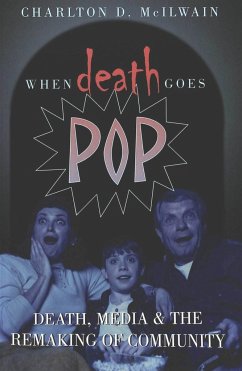Scholars, educators, health professionals, and activists from a variety of fields have struggled with one of the most significant questions of contemporary life: How do we rescue the experience of death and dying from the mire of fear, denial, and secrecy that it has been associated with for the better part of a century? In When Death Goes Pop, Charlton D. McIlwain describes a striking emerging shift in the way that death is represented in such omnipresent forms of media as television - a shift that seems to be moving the American discourse on death and dying from the private sphere to the public. The book surveys the past thirty years of death-related television programming, from daytime soaps to prime-time dramas, focusing primarily on Home Box Office's Six Feet Under and its innovative approach to the subject, and from the Sci-Fi Channel's Crossing Over to the genre of paranormal programming as a whole. This book also discusses the increasing use of multimedia and the Internetin the funeral industry and how the new technologies change the way that we remember the dead as they create and sustain what we might call a «virtual community of death».
«This book is a welcome addition to the literature on the social and cultural aspects of death and dying that I shall be recommending in my courses. It is perhaps the first sociologically relevant book-length treatment of popular media representations of death and is a significant advance on the current literature. The argument moves us past tired old debates about media violence and into new territories that stress media as potentially community-building. It draws on contemporary media theory, a thorough analysis of media representations, and audience studies to present a narrative that is highly relevant to current thinking in thanatology. Expanding, too, into an analysis of the Internet and other new media in the final chapters, the book brings together hitherto diverse fields of scholarship in an exemplary fashion. I congratulate the author on his achievement.» (Clive Seale, Professor of Sociology, Department of Human Sciences, Brunel University, West London, and Author of 'Constructing Death: The Sociology of Dying and Bereavement')
«Charlton D. McIlwain's 'When Death Goes Pop' is an ambitious and much-needed examination of the representation of death in contemporary popular culture. The book displays an impressive synthesis of media theory, rhetorical studies, and work in thanatology, and utilizes these various bodies of scholarship to render a lucid and provocative reading of contemporary popular culture... 'When Death Goes Pop' places representations of death within broader elements of culture, especially media technology, and, in so doing, provides an intelligible grid for thinking about death as a symbolic element in popular culture. One of the most impressive elements of McIlwain's work is his integration of empirical observations with sweeping theoretical insights. This book is an excellent example of strong critical research and should be invaluable to anyone interested in the study of popular culture and media.» (Kendall R. Phillips, Associate Professor of Communication and Rhetorical Studies, Syracuse University, and Author of 'Framing Public Memory: Rhetoric, Culture, and Social Critique')
«Charlton D. McIlwain's 'When Death Goes Pop' is an ambitious and much-needed examination of the representation of death in contemporary popular culture. The book displays an impressive synthesis of media theory, rhetorical studies, and work in thanatology, and utilizes these various bodies of scholarship to render a lucid and provocative reading of contemporary popular culture... 'When Death Goes Pop' places representations of death within broader elements of culture, especially media technology, and, in so doing, provides an intelligible grid for thinking about death as a symbolic element in popular culture. One of the most impressive elements of McIlwain's work is his integration of empirical observations with sweeping theoretical insights. This book is an excellent example of strong critical research and should be invaluable to anyone interested in the study of popular culture and media.» (Kendall R. Phillips, Associate Professor of Communication and Rhetorical Studies, Syracuse University, and Author of 'Framing Public Memory: Rhetoric, Culture, and Social Critique')








